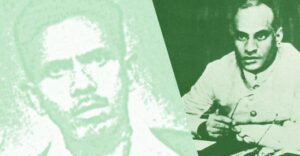

AK Pankaj
akpankaj@gmail.com
The Modern Political Democratic Legislative System with the participation of the Indian people started in 1921. When the British Government established Governor’s Legislative Councils at the Central and Provincial level, according to the India Act of 1919. Before the advent of the British, Indian society was governed by the system of local self-government. In the non-Adivasi society, there was a system of panch and monarchy where the king and the chief used to run the administration with the help of a few people. Whereas the system of self-government was prevalent in the Adivasi communities. After the establishment of the Company Raj, a new system of governance began in India in which there was no public participation.
But as the emancipation struggle against colonial slavery grew stronger in India and countries around the world, the British authority was forced to reform the system of governance. In India too, due to the anti-colonial and anti-imperialist wars being waged by the Adivasis and under the pressure of the independence movement, especially after the First World War, the British had to initiate the process of Democratic Reform. As a result, the Legislative System was introduced in 1921. A new legislative system, called the Legislative Assembly and Lok Sabha, with the participation of people’s representatives.
For the first time, Indians had the opportunity to participate in governance in the Governor’s Councils of the Central and State labels, established in 1921. For this, it was necessary for them to become people representatives by electing them by election. At that time it was very difficult to be a voter and become a candidate. Because only the wealthy and the elite of the upper castes, having money, status and prestige, could vote, and the same could participate in elections. In such a situation, as an Adivasi, it was almost impossible to become a representative of the Legislative Assembly by winning the election.
But in the first legislative election of 1921, two Adivasis of India turned this impossible into possible. The two people of the Adivasi community who are considered to be Junglee, Boor, Kol, Berberic and Head Hunter. One of them is from North-East and the other from Central India. The Rev. JJM Nichols Roy and Dulu Manki. One Christian Adivasi and the other nature worshiper Adivasi. Nichols Roy belonged to the Khasi Adivasi community of Shillong, Meghalaya. At the same time, Dulu Manki was a ‘Ho’ Adivasi of Chaibasa, the Kolhan headquarters of Jharkhand. The Rev. Nichols Roy was well-educated and had the support of church believers, but Dulu Manki was probably only educated until the third grade. Both these Adivasis stood in the election for the Provincial Legislative Assembly of 1921 and won by huge votes and became people representatives. This is where the history of Adivasi entry, participation, and intervention in the Indian legislative and democratic system begins.
Compared to Rev. Nichols of Shillong, Dulu Manki becoming MLC is historic in many respects. On the one hand, he was less educated than Rev. Nichols, second, his voters were not even aware of this new electoral method, and most were illiterate. Most importantly, Central India, where Adivasi society was surrounded on all sides by outsiders, their administrative headquarters, army, police, trade-industry, market and criminal gangs, was in direct competition they managed to win. And that too, from an unreserved seat. Because at that time no seats were reserved for Adivasis and Dalits. Rather, a provision was made that the Adivasi, Dalit, Women and backward weaker sections would be represented by nomination, which would be done directly by the Governor.
Dulu Manki belonged to the world famous Ho Adivasi community, known as ‘Laraka’, for the freedom wars, and belonged to Chaibasa, i.e. Dumbisai village. Before the arrival of the British, most of the city of Chaibasa was under the village of Dumbisai. The village is within the Gumra Peer of Kolhan, divided into several generations under the Munda-Manki self-government tradition, where the Manki, the supreme traditional leader, was Dulu Devgam. In 1840, when the Ho Adivasis came under British rule, the British, recognizing the Munda-Manki self-government tradition, considered the Kolhan region separate from the native princely states, and established a new administrative system for Kolhan, which was comparatively autonomous from the native princely states and British-ruled provinces. This autonomous administrative unit was called ‘Kolhan Government Estate’ by the British, and whose administrative headquarters was established on the land of the village of Dumbisai. Meaning, a part of the village of Dumbisai was called Chaibasa.
At the end of the nineteenth century, Dulu was born in the Manki family of Devagam gotra, in the same Dumbisai i.e. Chaibasa of Gumra Peer. Due to his versatility and efficient leadership, he was a very popular manki. For this reason, he became famous not only in Singhbhum of Kolhan, but also in the whole of Jharkhand as Dulu Manki instead of Dulu Devgam.
Dulu Manki is the name of that glorious chapter of Adivasi history, which, hundred years ago, did the impossible feat of being the first elected representative of Central India. The history of Adivasi participation in India’s Legislative and Parliamentary Democratic system begins with Dulu Manki. Whatever the Adivasis have achieved in today’s electoral democratic system in India, no doubt, the credit goes to Dulu Manki and Rev. JJM Nichols Roy. Who did the unprecedented courage to decode an external system for Adivasi existence and survival a hundred years ago. Later, on this strong foundation laid by them, the supreme leader of the Adivasis of India, Jaipal Singh Munda, established the politics of Adivasidom.
Hul Johar to these two Adivasi ancestors, Dulu Manki and Rev. JJM Nichols Roy.
Please Share and Support







